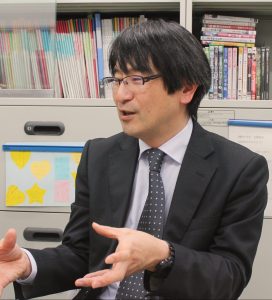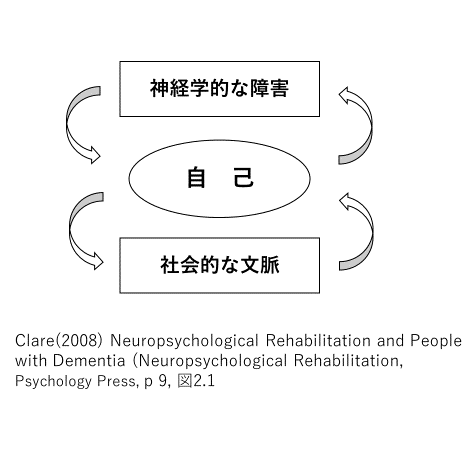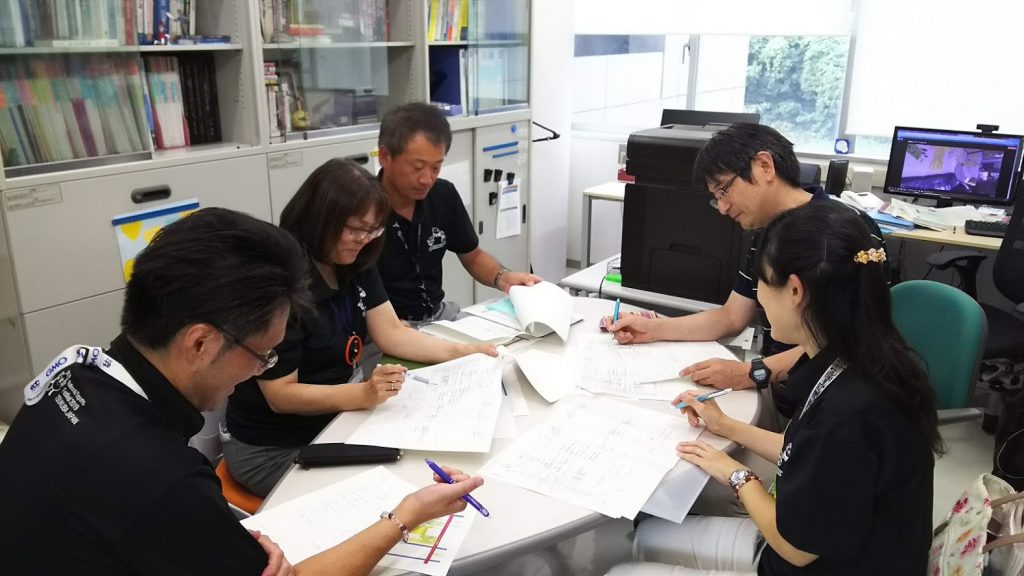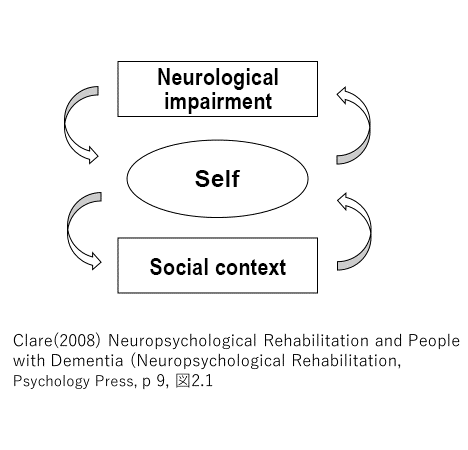キーワード: 認知症, 生物心理社会的アプローチ, 非薬物的介入, アセスメント, 啓発
http://www.human.tsukuba.ac.jp/~kyamanak/en/unit.html

先進諸国では、認知症の行動・心理症状(BPSD)だけではなく、認知機能の改善やQOL(生活の質の向上)なども含め、非薬物的な介入の効果検証が積極的に行われています。ところが我が国では、認知症治療の薬物的な介入の研究に比べ、こうした非薬物的な介入に関する研究はまだまだ少ない状況です。
認知症の人に対する生物心理社会的介入・リサーチユニットでは、生物的視点、心理的視点、社会的視点の3つの視点に基づき、認知症の「人」や周囲の人のつまずきを理解・軽減することで、少しでもQOLを上げられる非薬物的介入の体系の基盤を構築することを目的としています。
生物心理社会的介入のための基盤構築
本ユニットのタイトルを認知症ではなく、認知症の「人」に対する生物心理社会的介入としたのは、病気の治療ではなく、病気によって人生でつまずいている「人」に対して多角的なアプローチをもってサポートしたかったためです。

図1:認知症の「人」の生物心理社会的な理解
病気の治療に留まらないアプローチをするためには、図1で示したように、神経学的な障害(生物的視点)、つまり病気が本人の心理(自己)にどう影響するかをとらえる必要があります(心理的視点)。さらに周囲の人(家族、近隣、地域、医療・介護職)をはじめ、社会的な文脈が本人の心理にどのように影響を与えるのかについても考えていかなければなりません(社会的視点)。
こうした背景を踏まえ、私たちは「パラダイム・原理構築」「介入法開発」「アセスメントツール開発」の大きく3つの課題に取り組んでいます。
「パラダイム・原理構築」は、認知症の人の支援に関する考え方や原則を整理し方向性を明確にするもので、認知症ケアの考え方である「パーソン・センタード・ケア」「ケアラー・センタード/パーソン・センタード・ケア」「社会的健康」といったパラダイムの整理や、家族へのインタビューを通じた認知症が発症してからの生活のつまずきや喜びを感じた事柄などの調査をすることで、ケアの考え方の礎を築いています。

図2:認知症対応方法発見チャート(認知症ちえのわnetから抜粋)
「介入法開発」に関しては、認知機能維持やBPSDへの対処法の観点に立ち、認知活性化療法の開発と効果検証、マニュアルやツールの作成、全体の手順のフローチャート化など、開発した療法が現場で利用促進されるための一連の流れを設計しました。また、認知症になった人を介護する家族やスタッフに向けたアクセプタンス&コミットメントセラピーの技法を基盤としたプログラム開発も進めています。
「アセスメントツール開発」については、認知症の人へのアプローチで最も重要になるQOLに関する国際的な尺度の日本版を開発し、導入している療法が生活の向上に繋がっているかを調査することで、療法の見直しや改善に努めています。
現場や地域で研究する、貢献する

生活支援体制整備と地域ケア会議打ち合わせ
生活圏の縮小や経済的な困窮なども認知症によるつまずきです。当ユニットではこれらの問題に関する調査・分析を行い、自治体等の関連の会議にも積極的に参加して研究成果に基づく発言をします。こうした地域との関わりは地域に根差した発想を得るだけでなく、当ユニットの取り組みのひとつである「認知症フレンドリーな地域づくりの評価法」の開発に有益な効果をもたらしています。また、地域と密接な活動を行うことで現場に還元する循環を生み出すなど、私たちの研究成果は「生物心理社会的介入」という枠組みの外側にも広がっています。
社会への貢献・実績
-
認知症の人や家族の思いとケアの在り方に関する研究
-
認知活性化療法の研究、マニュアル作りや普及
-
応用行動分析に基づく認知症の行動・心理症状(BPSD)に対する職員研修のマニュアル・行動コンサルテーションの手順化
-
家族介護者の心理的支援方法の開発
-
認知症の人の生活の質に関する尺度や認知症に関する知識尺度の開発
-
認知症フレンドリーな地域作り
取材日:2020年2月14日
Understanding and Supporting “Persons” with Dementia from Three Perspectives: Disease/Impairment, ‘Self’ of the person, and Social context
Unit members : Kawano, Yoshiyuki
Other agencies : Uchida Tatsuji
Unit name: Research Unit for Interdisciplinary Autism Research
Keywords: dementia, biopsychosocial approach, nonpharmacological, intervention, assessment, enlightenment
http://www.human.tsukuba.ac.jp/~kyamanak/en/unit.html
Advanced countries actively study the effectiveness of nonpharmacological interventions not only to manage the behavioral and psychological symptoms of dementia (BPSD), but also to improve cognitive functions and the quality of life (QOL). In Japan, however, there are still only a few studies on such nonpharmacological interventions for dementia treatment, compared with the number for pharmacological interventions.
The Japanese situation moved us to build the Research Unit on Biopsychosocial Approaches for Persons with Dementia (PWD). In this unit, we study to understand and reduce the difficulties faced by PWD and the people around them from biological, patient-psychological, and social perspectives. Moreover, we aim to construct a foundation for nonpharmacological interventions allowing PWD to improve their quality of life (QOL).
Building a foundation for biopsychosocial interventions
We named this unit the “Research Unit on Biopsychosocial Approaches for Persons with Dementia”, not “for Dementia”, because our aim is to support “persons” who face difficulties in life due to their disease through multifaceted approaches, rather than treating the disease itself.

Figure 1: Understanding the biopsychosocial aspects of persons with dementia
In our unit, we view the influence of dementia (disease/impairment; biological perspective) and social contexts with dementia (social perspective) on persons’ self (psychological perspective), as shown in Figure 1. Social contexts include people surrounding PWD (family members, neighbors, communities, medical and care professionals).
According to this paradigm, we run many studies with 3 task forces: “the studies of paradigms/principles”, “studies of interventional techniques”, and “studies of assessment tools”.
The first task force aims to clear terminological similarities or differences of the major paradigms of dementia care including “person-centered care”, “caregiver/person-centered care”, and “social health”, because they are often misunderstood in Japan. The task also studies experiences of the dementia of PWD after its onset, including the difficulties and joys in their daily lives, through interviews with their family members. These findings could be a valuable resource to consider interventions or support.

Figure 2: Interactive Charts for BPSD Management (excerpted from )
In the task force of “the studies of interventional techniques”, we targeted development of techniques or strategies of Cognitive Stimulation Therapy and behavioral management techniques to be easily used in actual dementia care settings. They included developing methods, manuals, and other instructive tools (practical tips or flowcharts of protocols), and the examination of its effects. We are also developing a program based on acceptance and commitment therapy techniques for family carers and care staff who are working with PWD.
As for “studies of assessment tools”, we are developing an international assessment tool for QOL of PWD which is particularly important in dementia care. It is supposed to be widely used in dementia care to examine the effectiveness of variety of interventions or to improve them from the result of the assessment.
Conducting research in, and contributing to, actual settings/communities

Preparation for a Life Support System Development and Community-based Care Meeting in Tsukuba City
Limitations of everyday activities and poverty are also huge problems due to dementia. We are investigating the problems. Moreover, we actively participate in related meetings in municipalities and often show the result of the research and give suggestions.
Active commitments to communities not only help us develop community-based perspectives, but also give much benefit for the development of evaluations for dementia-friendly communities, which is another of our tasks. In addition, by utilizing feedback to actual settings through close collaboration with communities, our research results are also being used beyond the framework of “biopsychosocial interventions”.
Social contributions and achievements
-
Studies on thoughts and feelings of people living with dementia and their family carers, which should be incorporated into their care
-
Studies on cognitive stimulation therapy (Japanese version), including development of a manual and its dissemination.
-
Studies on staff training and consultation for the management of behavioral and psychological symptoms of dementia (BPSD), based on applied behavioral analysis, including development of a manual for training and the systematization for consultations.
-
Development of methods to provide psychological support for family caregivers
-
Development of scales to measure the QOL of PWD and knowledge of dementia
-
Dementia-friendly community development
Interviewed on Feb., 14, 2020
